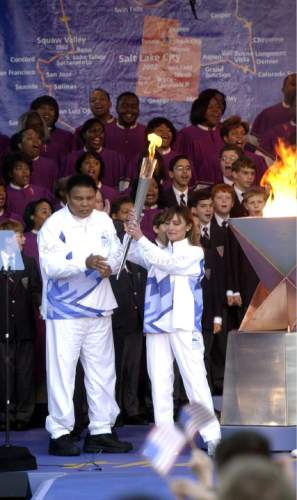This is an archived article that was published on sltrib.com in 2016, and information in the article may be outdated. It is provided only for personal research purposes and may not be reprinted.
In 1974, George Foreman and Muhammad Ali met in Zaire for one of the most well-chronicled events in the history of boxing, athletics and the 20th century.
Four decades later, Ali's eighth-round triumph in "The Rumble in the Jungle" remains a popular subject across mediums.
But few may know that the week before Foreman and Ali were scheduled to depart for Kinshasa, the boxing legends fought before 6,000 fans at Salt Lake City's Salt Palace.
That is, they fought for a few rounds, for charity, against sparring partners — not each other.
But it was a star-studded affair. Ali archrival Joe Frazier also sparred, and comedian Bob Hope served as emcee. "I had to quit fighting because they ran out of blood donors," Hope quipped. Ali took the ring and complained about empty seats.
"In two weeks, I'm fighting the biggest fight in history, and you can't even fill this place," Ali said before going three rounds against Larry Holmes and two against Eddie "Bossman" Jones.
The Rumble, incidentally, would be delayed a month by a training injury to Foreman.
Such was the scope of Ali's fame that few locales do not claim some small footnote in the history of a man known internationally as "The Greatest." Utah is no different.
Ali, who died Friday night in a Phoenix hospital, at age 74, counted among his friends Utah Sen. Orrin Hatch, who was visited by Ali at his office in 1988 and later wrote two songs in his honor.
It was at the Salt Lake International Airport in September 1974 that Ali met his third wife, a model named Veronica Porsche. People magazine wrote in 1976 that Ali invited Porsche to Zaire after a "long, intimate chat" — infuriating second wife Khalilah Camacho-Ali when Porsche took him up on the offer.
Ali would have fought in Utah for real if West Jordan's Marv Jenson, who managed champion middleweight Gene Fullmer, had gotten his way.
When Ali refused to serve in the military during the Vietnam War and couldn't find a state that would sanction a fight, Jenson appealed to Utah Gov. Calvin Rampton, who said he would allow it if the state commission would sign off.
Jenson secured a signature from Ali. In fact, he secured two signatures: Ali also signed under given name Cassius Clay.
But Ali never fought in Utah — besides the pre-Rumble exhibition — though he was no stranger to the Beehive State.
He spoke to students at Utah State University's Spectrum in 1971 as part of a school lecture series.
A Tribune photo shows Ali at the bedside of a 13-year-old girl at Salt Lake City's Primary Children's Medical Center in January 1986.
And during the summers of 1996 and 1997, Ali appeared at a charity golf tournament Hatch organized at Midway's Homestead Golf Club.
Having lit the Olympic cauldron at the 1996 games in Atlanta, the Salt Lake Organizing Committee in 1997 named him its "First Ambassador" for the 2002 games during a fundraiser at Salt Lake City's Capitol Theatre, where a choir of Utah children sang the title song to the Oscar-winning Rumble documentary "When We Were Kings."
During that visit, Ali attended the Mormon Tabernacle Choir's Sunday-morning service, signed autographs at Nordstrom and performed a magic trick outside Salt Lake International Airport after the radiator overheated in his limo.
He returned in March 1999 for a cameo on the CBS television series "Touched by an Angel," which improvised a boxing gym in a South Salt Lake warehouse.
He later lit the first Olympic torch in the 2002 relay, passing it to figure skaters Peggy Fleming and Bob Paul and sending it on its way from Atlanta to Salt Lake City.
And while Ali never squared off in a meaningful fight in Utah, he did fight a Utahn.
In April 1961, Ali — then Clay — predicted he'd knock out West Jordan's LaMar Clark in the second round at Louisville's Freedom Hall.
Clark entered the fight having remarkably knocked out 44 consecutive fighters, but Ali was true to his word. After breaking Clark's nose with a straight right in the second, the 19-year-old Ali sent him to the canvas twice more within the next minute.
For all his bravado before the fight, Ali would later give Clark credit.
Clark had landed a right to the chest that was — at that early juncture — the hardest Ali had ever been hit, he said.
—
Do you have any stories about Muhammad Ali in Utah? Email Tribune reporter Matthew Piper at mpiper@sltrib.com or leave him a voice message at 801-257-8768.



